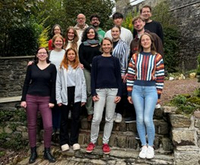Projects Offered
Dorothee Dormann René Ketting Edward Lemke Stamatis Papathanasiou Johannes Mayer_Ageing Johannes Mayer_Dynamics Daniel Sasca Natalia Soshnikova Tim Sparwasser Ari WaismanMolecular mechanisms of neurodegenerative diseases
1 PhD project offered in the IPP summer call Molecular Mechanisms in Genome Stability & Gene Regulation
Scientific background
In the Dormann lab, we study how RNA-binding proteins (RBPs), such as TDP-43, FUS or TAF15, become dysfunctional in diseases such as amyotrophic lateral sclerosis (ALS), frontotemporal dementia (FTD) and Alzheimer’s disease (AD). These RBPs function in various RNA metabolic pathways, including the regulation of transcription, pre-mRNA splicing, mRNA stability and translation as well as in DNA damage repair. A subset of patients with ALS, FTD and AD present pathological cytoplasmic redistribution and aggregation of TDP-43, FUS or TAF15, however it is still not well understood how these proteins become mislocalized and aggregated in disease and how RBP aggregation causes a decline in cellular function and eventually neurodegeneration.
PhD project: Role of cellular mechanical stress in RNA-binding protein aggregation diseases
We and others previously showed that different types of cellular stress, e.g. oxidative stress or heat shock, elicit recruitment of RBPs into stress granules (SGs) and that SGs and aberrant phase transitions can lead to pathological TDP-43 or FUS aggregation. In this project, we now want to focus on mechanical stress and investigate how it impacts RBP mislocalization and aggregation. We will apply mechanical stress, e.g. through mechanical agitation or by applying shear forces in microfluidic devices, and will investigate how this impacts phase separation and aggregation of TDP-43, FUS or TAF15 in vitro. We will also apply mechanical stress to cells and will investigate how (in comparison to other cellular stressors) it impacts nucleocytoplasmic transport and the formation of SGs, and hence cytoplasmic mislocalization and aggregation of RBPs, such as TDP-43, FUS or TAF15. We also seek to investigate how the presence of aggregates in cells impacts the mechanical properties of cells, e.g. changes to the viscoelasticity of the cytoplasm and/or nuclear shape.
To address these questions, we will use recombinant proteins to study phase separation/aggregation in vitro, e.g. with microscopic or biophysical assays, as well as cell lines and neuronal cell culture models to study the intracellular RBP behaviour using diverse imaging techniques (e.g. confocal microscopy, live cell imaging) combined with biochemical and cell biological methods or proteomics.
The PhD project is part of the EU-funded doctoral training network “NEUROMECH”, which seeks to characterize the role of mechanobiology in the pathogenesis of neurodegenerative diseases. Investigators in the consortium have expertise in mechanobiology, neurodegeneration, DNA damage, neuropathology, medical imaging and big data analysis. Students will profit from lab exchanges and diverse training activities within the NEUROMECH network.
If you are interested in this project, please select Dormann as your group preference in the IPP application platform.
Publications relevant to the project
Simonetti F, Zhong W, Hutten S, Uliana F, Schifferer M, Rezaei A, Ramirez LM, Hochmair J, Sankar R, Gopalan A, Kielisch F, Riemenschneider H, Ruf V, Schmidt C, Simons M, Zweckstetter M, Wegmann S, Lashley T, Polymenidou M, Edbauer D#, Dormann D# (2025) Direct interaction between TDP-43 and Tau promotes their co-condensation, while suppressing Tau fibril formation and seeding. EMBO J. 44(24):7395-7433 Link
Gruijs da Silva LA, Simonetti F, Hutten S, Riemenschneider H, Sternburg EL, Pietrek LM, Gebel J, Dötsch V, Edbauer D, Hummer G, Stelzl LS and Dormann D (2022) Disease-linked TDP-43 hyperphosphorylation suppresses TDP-43 condensation and aggregation. EMBO J, 41:e108443 Link
Alberti S, Dormann D. (2019) Liquid-Liquid Phase Separation in Disease. Annu Rev Genet. Dec 3;53:171-194. Link
Hofweber D*, Hutten S*, Bourgeois B, Spreitzer E, Niedner-Boblenz A, Schifferer M, Ruepp MD, Simons M, Niessing D, Madl T, Dormann D# (2018). Phase separation of FUS is suppressed by its nuclear import receptor and arginine methylation. Cell 173(3):706-719.e13 Link
